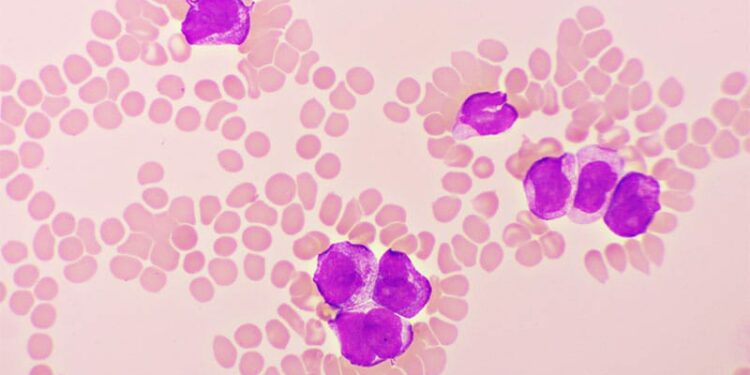[ad_1]
TOPLINE:
Inotuzumab ozogamicin (IO), an anti‐CD22 antibody conjugated with calicheamicin, was well tolerated and demonstrated an overall response rate of 74% in adult patients with relapsed/refractory B-cell acute lymphoblastic leukaemia (B-ALL) in a real-world study.
METHODOLOGY:
- Researchers conducted a multicentre retrospective cohort study involving 73 adult patients (median age at IO initiation, 52.7 years) with relapsed/refractory B-ALL treated with IO across 24 Italian centres from 2014 to 2019.
- The study population was heavily pretreated, with a median of three lines of therapy. About 43.8% of patients had undergone an allogeneic stem cell transplantation before IO, and 57.5% of patients had received blinatumomab before IO.
- IO administration followed the standard schedule, with 0.8 mg/sqm on day 1 and 0.5 mg/sqm on days 8 and 15 in the 21-day course, followed by 0.5 mg/sqm on days 1, 8, and 15 in the subsequent 28-day course.
- Primary endpoints were complete remission, event-free survival (EFS), overall survival (OS), and incidence of grade ≥ 3 adverse events (AEs). The median follow-up duration was 37.2 months.
TAKEAWAY:
- The overall response rate was 74.0%, including 51 patients with complete remission and three patients with complete remission with incomplete haematologic recovery. The median duration of response was 4.4 months.
- The median OS was 7.9 months, with 1-year and 3-year OS rates of 40.2% and 21.2%, respectively. The median EFS was 4.5 months.
- Veno-occlusive disease/sinusoidal obstruction syndrome occurred in eight patients (11.0%). The most frequent grade ≥ 3 haematologic AEs were thrombocytopenia and neutropenia, and the most common grade ≥ 3 non-haematologic AEs were liver toxicities and pneumonia.
- Overall, 37% of patients proceeded to allogeneic haematopoietic stem cell transplantation after IO therapy.
IN PRACTICE:
“The INO‐CD22 study represents a significant step forward in our understanding of IO’s role in treating R/R [relapsed/refractory] ALL. It provides a comprehensive overview of IO’s real‐world application, efficacy, and safety,” the authors wrote. “Insights from real-world studies such as INO-CD22 will be invaluable in shaping future research, treatment guidelines, and patient care strategies and properly allocating the drug in the therapeutic journey of patients with B-ALL,” they added.
SOURCE:
This study was led by Cristina Papayannidis, MD, PhD, IRCCS Azienda Ospedaliero-Universitaria di Bologna, Istituto di Ematologia “Seràgnoli,” Bologna, Italy. It was published online in Cancer.
LIMITATIONS:
Researchers acknowledged the inherent limitations of this retrospective observational research, including potential biases and variability in data quality. Additionally, the absence of a randomised control group and the relatively small sample size might affect the interpretation of the results.
DISCLOSURES:
This study was partially supported by Pfizer s.r.l. and the Italian Ministry of Health. Several authors reported having professional activities and other ties with various sources.
This article was created using several editorial tools, including AI, as part of the process. Human editors reviewed this content before publication.
[ad_2]
Source link : https://www.medscape.com/viewarticle/novel-antibody-drug-shows-promise-hard-treat-acute-2025a10007c2?src=rss
Author :
Publish date : 2025-03-31 12:00:00
Copyright for syndicated content belongs to the linked Source.














